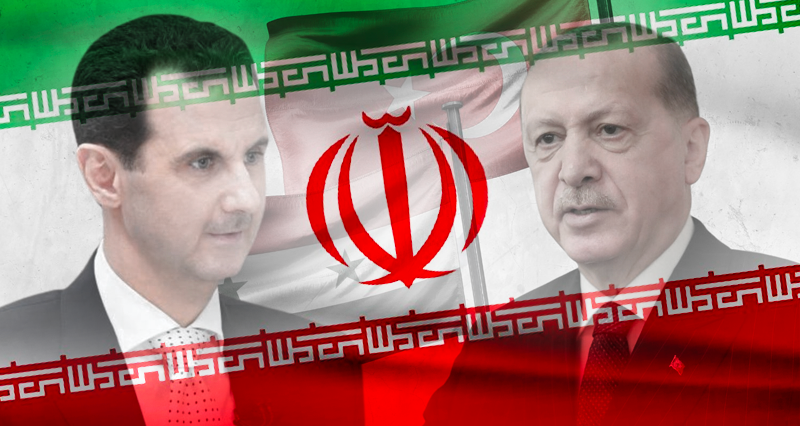The likelihood of a meeting between Recep Tayyip Erdogan and Bashar Assad as Türkiye’s and Syria’s highest political officials has increased in the coming months following official meetings between the two countries at the level of the defense ministries and high security officials in the previous weeks.
Russia has played a major role in pulling two neighboring countries closer together and establishing official relations between the two nations, and it is, in some ways, the driving force behind the restoration of official political ties between Ankara and Damascus.
The restoration of official ties between the two major Middle Eastern nations, whom have gone through the most difficult period of their relationship in the last ten years, is unquestionably critical for regional stability as well as the possibility of a political opening inside Syria for the repatriation of Syrian refugees and maintaining control over the future of armed oppositions against Damascus–some of which are unquestionably terrorist organizations.
But, in the meantime, Iran’s stance regarding this rapprochement is significant. Will the rewards of this reconciliation delight Tehran’s politicians, or will they see their political interests in clashes with this new round of political developments in Syria?
A predictable move
The resumption of relations between Ankara and Damascus, or rather Ankara’s efforts to reestablish official relations with Damascus, is not a new development. These efforts are part of a series of political movements by the Middle Eastern countries that have been occurring following the failure of plans to overthrow the Damascus government in order to secure their interests in Syria’s new era.
The new Bahraini ambassador to Syria began his mission earlier in June 2022. Also, while in Damascus, Algeria’s foreign minister declared that his country is working with other Arab nations to get Syria’s membership in the Arab League reinstated. Bashar Assad spoke over the phone with Jordan’s King Abdullah II. The foreign minister of Oman also traveled to Syria on an official trip, where he met and spoke with his Syrian counterpart.
The two visits to Damascus by the UAE Foreign Minister and his meeting with Bashar al-Assad, the president of Syria, were perhaps the most significant of these instances in the interim. All of this, along with numerous covert initiatives by nations around the world and in the region to normalize ties with Damascus, point to a new chapter in Syria’s diplomatic history. Türkiye’s efforts are naturally a part of these initiatives. Therefore, it is not appropriate to regard official high-level meetings between Ankara and Damascus as unexpected or strange occurrences.
Iran also shares the same point of view and sees the reestablishment of diplomatic ties between the two nations as a political reality that builds upon the efforts of other nations around the world.
An old game
Iran has demonstrated throughout its recent 40-year relationship with Damascus that it is aware of the demands of the regional political atmosphere, and at various points in Syria’s diplomatic relations with various nations, it has never sought to impose its demands on the Damascus administration.
Syria’s negotiations with Israel and the United States in the 1990s is one of the most prominent examples of how, despite all the sensitivities and concerns, Tehran never allowed itself to interfere in Damascus’ relations with other countries.
Another example of this situation can be seen in the extraordinary rapprochement of Damascus and Ankara in the years preceding the Arab Spring, when Damascus moved away from Tehran in favor of its other regional rivals based on the political and administrative activities of Türkiye and the financial and economic support of Arab nations. During this time, however, Tehran declined to interfere with the process.
Observing Tehran’s behavior toward Damascus for forty years reveals that Tehran is aware of its limitations in meeting Damascus’ requirements, and thus, in order to avoid incurring an unexpected political cost that would cause the Syrian government’s displeasure with Tehran, it shows no attempt to disrupt Damascus’ relations with others.
Tehran officials are aware that they do not have the required capacity to meet the needs of Damascus, particularly for quickly reconstructing its infrastructure and meet the financial and monetary needs of the government during the post-war period, and it is only natural for Damascus to turn to other players in order to fulfill these needs.
Reasserting Syria’s diplomatic status
Damascus’ release from the diplomatic impasse and the restoration of its rulers’ international legitimacy are just two of the other factors that have Iran satisfied or even pleased with the development of its relations with countries such as the United Arab Emirates, Türkiye, Egypt, and other nations in the region. The Syrian government has come under the worst political and media scrutiny during the past ten years, and as a result, this nation is now isolated internationally.
After such an experience, it only makes sense that building ties with a nation such as Türkiye—which, incidentally, led the most severe attacks against the Damascus government and did not hold back from taking any action to hit it—would be a crucial step in helping Syria break out of its current state of isolation and it will give Damascus the chance to once again revive Syria’s unique role in West Asia. It is only natural that Iran, a crucial ally of Syria, would welcome such a scenario and wish for the Arab nation to once again assume the role of a regional player.
Triumphant joy
Iran emphasizes these initiatives, particularly in its media and domestic public opinion, as evidence of its triumph in the recent 10-year-long Syrian fight, contrary to the first assumption that Iran is dissatisfied with the restoration of diplomatic relations between Türkiye and Syria.
From the viewpoint of Iranians, the fact that the nations that were unwilling to acknowledge Bashar al-Assad in the Damascus government are now attempting to contact him, shows that they have retreated from their positions, and this represents a diplomatic triumph for Iran. It is of great importance since among the nations in the region, Türkiye in particular, demonstrated the highest level of sensitivity toward Bashar al-Assad. Iran, which has long been dissatisfied with Ankara, is understandably pleased about Erdogan’s withdrawal.
Concerns
Iran naturally worries about being excluded from Syria’s interactions and equations, notwithstanding the advantages that the improvement of Türkiye-Syria relations and Syria’s relations with other nations in the region may offer for Iran. After Russia’s influence on the political climate of Syria became more noticeable, Iran will understandably be concerned about countries like the UAE and Türkiye that may individually offer Damascus with significant economic benefits comparing to Iran.
Iran will be annoyed that Ankara, which has had a long-standing animosity with Bashar al-Assad, will get greater economic gains from Syria’s reconstruction than Tehran, which has incurred significant financial and political expenses over the years to support Bashar al-Assad. Tehran is concerned that this experience would be repeated in Syria because it has previously observed the greater agility of Turkish businesspeople compared to Iranian businessmen in the Caucasus, Central Asia, and Iraq.
















Leave a Reply